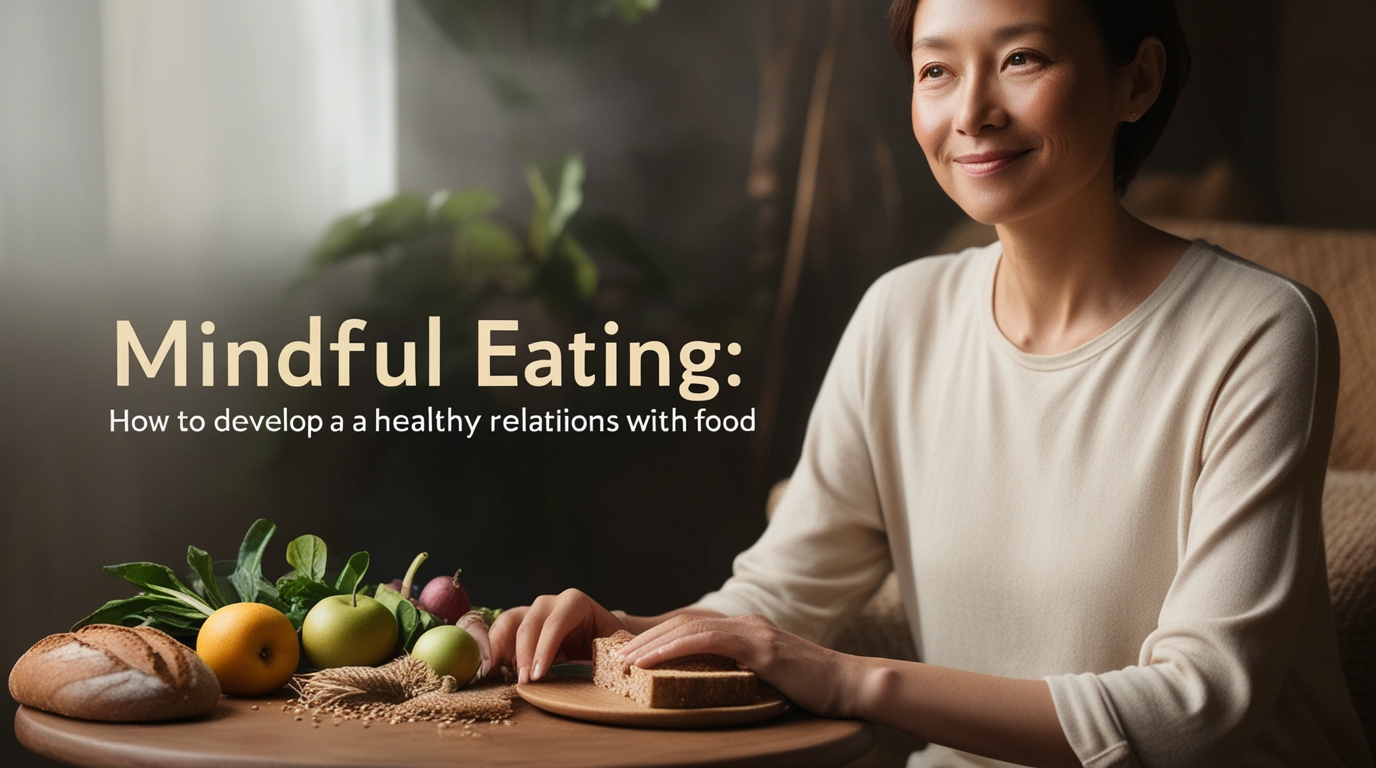Eating has become something we often do without much thought. We eat while watching TV, scrolling through our phones, or even while working. Over time, this can lead to overeating, poor digestion, and even an unhealthy relationship with food.
Mindful eating is a practice that encourages us to slow down, enjoy our meals, and truly connect with our bodies. This approach helps build a healthier relationship with food, both physically and mentally. Let’s get started.
If you wish to grow a relationship with food click here.
What Is Mindful Eating?
Mindful eating is about being available during meals. Instead of rushing through or eating out of habit, it encourages paying attention to your food, enjoying every bite, and recognizing your body’s hunger and fullness signals. It’s not a diet; it’s a way to enjoy food more and improve your overall well-being.
How to develop a healthy relationship with food
Eat Slowly and enjoy Your Food
Main principle of mindful eating is to slow down. When we eat quickly, we tend to overeat because our brains don’t get the signal that we’re full until later. Eating slowly allows you to enjoy each bite, enjoy the flavours, and better recognize when you’re satisfied.
How to Do It:
- Take smaller bites.
- Chew your food thoroughly before swallowing.
- Put your fork down between bites and take time to enjoy the texture and taste of the food.
This way, your body has time to till you when you’ve had enough, and you’ll also find that food becomes more enjoyable when eaten mindfully.
Listen to Your Hunger and Fullness Signs
It’s common to eat because it’s “lunchtime” or because food is available, even when we’re not really hungry. Mindful eating encourages you to listen to your body and eat when you’re hungry, not out of habit or boredom.
How to Do It:
- Before eating, ask yourself, “Am I truly hungry?”
- During meals, pause regularly to check in with your body. Are you feeling full? It’s okay to stop eating when there’s food left on your plate.
- Avoid eating until you’re uncomfortably full. Aim for a comfortable level of satisfaction instead.
Learning to recognize your body’s signals can help prevent overeating and create a more balanced approach to food.
Eliminate Distractions While Eating
Many people eat while multitasking, such as watching TV, working, or scrolling through social media. These distractions prevent us from fully enjoying our meals and can lead to overeating because we’re not paying attention to how much we’re eating.
How to Do It:
- When eating, focus simply on your meal. Switch off the TV, put away your devices, and take a break from work.
- Sit down at a table rather than eating while being busy.
- Engage your senses—notice the colours, smells, and flavours of your food.
By eliminating distractions, you can be more in tune with how much you’re eating and enjoy your food more deeply.
Allow Yourself to Enjoy Food
Many people have a tricky relationship with food, feeling guilty about eating certain foods or overeating. Mindful eating is about enjoying your food without judgement. It’s important to let go of food guilt and allow yourself to enjoy all types of food in balance.
How to Do It:
- Rather than marking foods as “good” or “bad,” focus on how different foods make you feel.
- When you have a craving for something sweet, allow yourself to enjoy it without feeling guilty.
- Remember that food is a source of nourishment and pleasure, and both are important.
A healthy relationship with food means enjoying a balance of both nutritious meals and treats without guilt or restriction.
Be Aware of Emotional Eating
Emotional eating is when you depend on food to deal with emotions like stress, boredom, or sadness, rather than hunger.Depending on food to manage emotions can lead to an unhealthy relationship with eating.
How to Do It:
- Before eating, ask yourself, “Am I eating because I’m hungry, or because I’m feeling stressed or emotional?”
- If it’s emotional hunger, try finding other ways to cope, like going for a walk, journaling, or talking to a friend.
- Practice self-care and avoid punishing yourself for emotional eating. Instead, work on developing healthier avoidance reactions over time.
Pay Attention to Portion Sizes
It’s easy to eat too much when we’re not paying attention to portion sizes, especially when eating out or snacking. Mindful eating encourages you to be aware of how much you’re eating and to stop when you’re satisfied.
How to Do It
- Start with smaller portions, and if you’re still hungry, you can always go back for more.
- Serve your food on a plate rather than eating straight from the package, which can help you keep track of how much you’re consuming.
- Listen to your body and stop eating when you feel comfortably full, even if there’s food left.
Being mindful of portion sizes can help you avoid overeating and promote better digestion.
Reflect on How Food Affects Your Body
Another aspect of mindful eating is noticing how different foods make you feel. Some foods may leave you feeling energised and satisfied, while others might make you feel lazy.
How to Do It:
- After eating, take a moment to reflect on how the meal made you feel. Did it give you energy? Did it leave you feeling too full or uncomfortable?
- Use this reflection to guide your future food choices.Choose foods that make you feel good and support your overall well-being.
Paying attention to how food affects your body helps you make healthier choices and build a more positive relationship with food.
Conclusion
Mindful eating is a powerful way to develop a healthy relationship with food. By slowing down, listening to your body, and enjoying your meals, you can enjoy food more fully and make better choices that support your health and well-being. It’s not about dieting or restricting yourself—it’s about being present, enjoying food without guilt, and nourishing both your body and mind.
Start small by including one or two mindful eating practices into your daily routine, and over time, you’ll notice a shift in how you feel about food and how it impacts your life.





